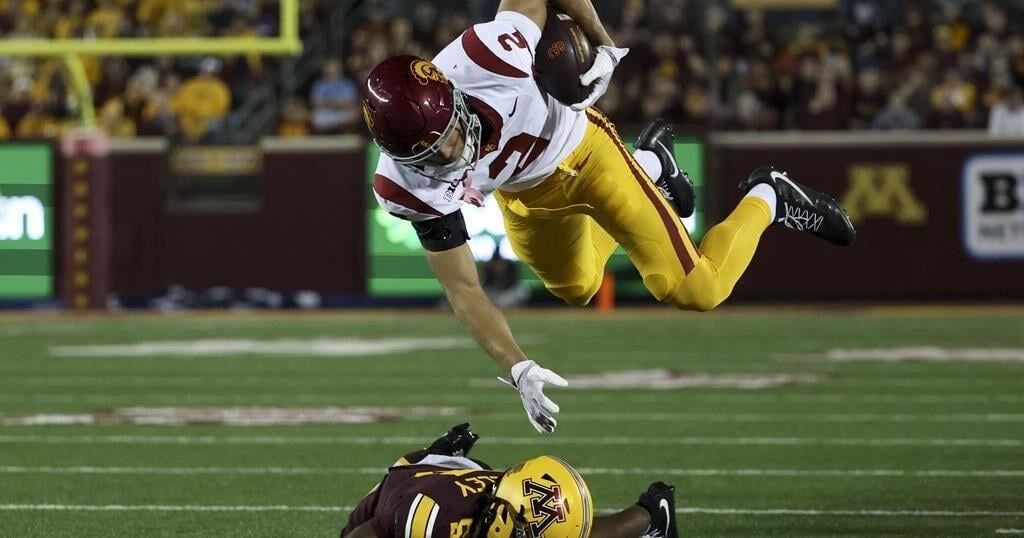COLUMBIA, S.C. (AP) — College football is on high alert for players flashing make-believe guns at an opponent.
That happened Saturday when freshman edge rusher Dylan Stewart, who sacked Mississippi quarterback Jaxson Dart for a loss of eight yards on third down, stood over him and pretended to shoot his opponent with a repeating firearm.
Stewart was called for unsportsmanlike conduct and South Carolina was penalized 15 yards.
The flag did not deter Stewart, who celebrated the same way — he got off three shots of his pretend shotgun — a few minutes later after stopping Rebels runner Matt Jones for a 4-yard loss. No penalty was called on that play.
At Minnesota, defensive back Justin Walley broke up a pass in his team’s 24-17 win over then-No. 11 Southern California, then lifted up his shirt as if he were showing a handgun sticking out of his waistband.
Walley was flagged for unsportsmanlike conduct for what the official said was “simulating brandishing a gun.”
“There’s a list of automatic unsportsmanlike conduct fouls. One of them in our rule book is simulating firing of a weapon,” Steve Shaw, the NCAA’s national coordinator of officials, told The Associated Press by phone Tuesday. “That’s not really a judgement call.”
It seems like a case of bad judgement by the players who consider those actions when they celebrate. The incidents show the NCAA sending a message to keep violence, even the pretend kind, out of its game.
“We’re starting to see, I hate to say it, but more and more of it,” Shaw said. “We’re just trying to say that’s not acceptable. Gun violence is not acceptable in our game.”
It can be difficult to get that message to young players like Stewart, who turned 19 last month and has had an immediate impact on the Gamecocks’ defense. He’s had 3.5 sacks and 5.5 tackles behind the line of scrimmage in his first five college games.
Such displays are sometimes seen in the NFL. Jets receiver Allen Lazard was penalized for firing finger guns after a first-down catch against Denver two weeks ago. He was also fined $14,069 for “unsportsmanlike conduct for a violent gesture,” according to the NFL.
South Carolina coach Shane Beamer said he spoke with Stewart after the penalty and he’s talked with all his players about reducing pre-snap and post-play infractions.
The gesture was “unacceptable,” Beamer said “And Dylan Stewart feels awful about that play. Dylan Stewart’s a really good kid, and Dylan Stewart’s mom feels awful about that play.”
Minnesota coach P.J. Fleck said at his weekly news conference that he tells his players to celebrate with teammates and not leave themselves open to an officials’ interpretation of their actions.
“In our world right now, we’re talking about everybody should express themselves, rightfully so,” Fleck said. “Sometimes we’re flagging a particular move, sometimes we’re not. Our whole thing to counter that is don’t leave it up to somebody to interpret something the wrong way.”
Dart, who leads the Southeastern Conference in passing, responded to Stewart’s fake shooting on social media, quoting late rapper Young Dolph’s song, “100 Shots.”
“How the … you miss a whole hunnid shots?” Dart said, using a line from the song after the Rebels’ 27-3 victory.
Shaw said players have to understand they can celebrate in creative ways after big plays. He after the NCAA penalized the throat slash gesture, some players turned to a simulated nose wipe, which is not against the rules.
NCAA spokesman Greg Johnson said Shaw recently sent around a reminder in mid-September to conferences and their football officials to emphasize treating weapon gestures as penalties.
“This was done with the goal of this rule being officiated consistently on a national basis,” Johnson said.
Beamer said he’ll keep any punishment for Stewart inside South Carolina’s football building. Young people make mistakes, he said, and that’s when you help them make the right decisions going forward.
“It’s our job to help,” Beamer said, “like a parent would do with a child.”
___
Get poll alerts and updates on the AP Top 25 throughout the season. Sign up here. AP college football: and
